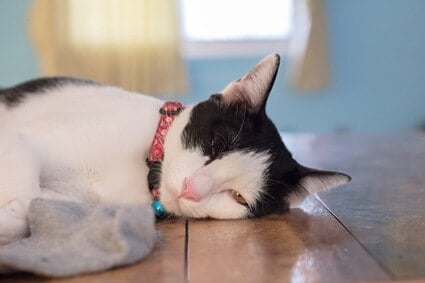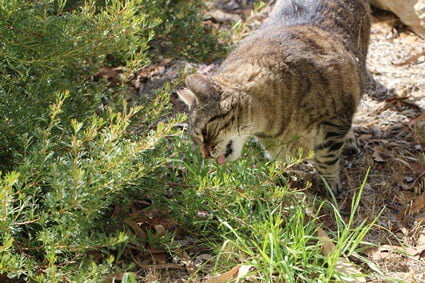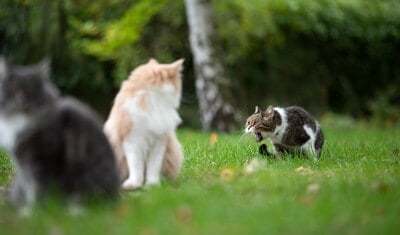Cats can eat too much food or too fast, especially if they face competition for a meal from another pet. However, a cat that vomits and has no interest in eating or drinking for more than 24 hours is far more concerning.
Constipated cats will vomit and lose their appetite. Allergic reactions, toxin consumption, gastritis, and kidney disease can also lead to a loss of appetite and cause vomiting. Other medical explanations include pancreatitis, respiratory infections, or tumors. Your cat could also be experiencing adverse side effects from vaccines, medicine, or surgery.
Vomiting isn’t always a sign of ill health. If the cat behaves normally and does not vomit again within 24 hours, it may have a hairball, have consumed soiled food, or have eaten its meal too quickly.
Why Is My Cat Throwing Up and Not Eating All of a Sudden?
Cats rarely survive more than a few days without food. If the cat is also not drinking, it is in even greater danger. It’s important to identify why your cat is sick and has stopped eating. Here are some reasons for the issue:
Gastritis
Gastritis is a stomach upset that causes the inflammation of a cat’s stomach lining. Vomiting, diarrhea, dehydration, and a reluctance to eat are all known symptoms. There are two forms of gastritis in cats:
- Acute gastritis: This will usually right itself within a few hours. It’s often caused by overeating food, so it’s most common in kittens.
- Chronic gastritis: This lasts for 1-2 weeks. A physical examination and blood tests will be needed to determine how to proceed.
Often, gastritis is related to bacterial infection. According to Infection and Immunity, helicobacter pylori is often linked to gastritis.
The prognosis depends on the cause. A urinalysis, fecal, and blood tests will need to be performed to identify the cause of chronic gastritis. These will be combined with x-rays of the abdomen and ultrasound.
If the condition doesn’t right itself, an anti-emetic medication, such as maropitant, may be prescribed by a vet. A gastrointestinal medication may also be given to protect the cat’s stomach from ulcers.
Constipation (Colitis)
If your cat is constipated, it will struggle to digest food. This will result in vomiting and a reluctance to eat. Your cat will not be able to fit anything else into its digestive tract. The stomach will be blocked with waste.
Eventually, feline constipation will lead to a condition called megacolon. This is a swelling of the colon. If a cat does not eliminate, feces will remain in its colon, so the mass of this waste will be larger than the colon itself.
Whatever the explanation for megacolon, treatment is comparatively simple. Veterinary Clinics of North America: Small Animal Practice recommends the use of fiber supplements and laxatives.
Once a cat’s digestive tract returns to normal, it will not require treatment. Laxatives and additional fiber can give cats diarrhea.

Food Allergies
Cats can develop allergies at any time of life. Environmental allergies are common, but food allergies are the most frequent. If you have recently changed your cat’s diet, this may explain vomiting and inappetence.
The signs of an allergic reaction in a cat often manifest on the skin. The Journal of Nutrition discusses how food intolerance can also lead to vomiting. If this is the case, your cat will not want to eat as it realizes that food makes it sick.
Manage this by taking away the food that is making your cat ill. Offer something bland as a replacement, such as chicken and rice. You could also use kibble, but if your cat is not drinking, this risks dehydration.
If your cat eats and keeps food down, you have the first stage of your answer. Your cat will still need to eat cat food, though. This is how a cat gets the nutrients that it requires to thrive.
Check the ingredients of the food that made your cat sick. You may locate the allergen within this. If you have changed the brand, compare the two foods. The outlier will reveal where the problem lies.
Gastrointestinal Blockages
If your cat is vomiting and refusing food or water, investigate the possibility of an intestinal blockage. Cats often eat and swallow inappropriate items. If these are not digestible, they will not pass through the small intestine.
If a foreign object is trapped in a cat’s small intestine, food cannot bypass it. This will result in the cat vomiting. In addition, the cat’s stomach will hurt. The cat will not want to eat or drink. It is associating food with pain.
Sometimes, the blockage is mild. Your cat may have a hairball. This will pass in time. Speed the process by offering your cat olive oil. This will lubricate your cat’s insides. If this is unsuccessful, laxatives may help.
Serious Intestinal Blockages
Some hairballs are more problematic than others. The Journal of Feline Medicine and Surgery explains how sizeable hairballs are called trichobezoars. These are more commonly found in senior longhaired cats. Trichobezoars must be treated as they won’t just go away.
If your cat swallowed a sizable object, surgery may be required. Before reaching for a scalpel, a vet will attempt to flush out the item with fluids. Intravenous fluids can help break down a blockage.
If this is not an option, your cat will be anesthetized and keyhole surgery will be performed. The object will be removed and your cat stitched up. Ensure that a senior cat is healthy enough to ensure this procedure.
Upper Respiratory Tract Infections
Almost all cats will catch a respiratory virus at some time in their life. The Journal of Feline Medicine and Surgery surveyed 740 cats, finding respiratory viruses in 82% of them.
The symptoms of upper respiratory tract infections are more commonly linked to the common cold. Cats with a respiratory infection will cough and sneeze a lot, usually releasing discharge. The cat will also likely endure streaming eyes.
Some cats struggle with vomiting and diarrhea while battling a respiratory infection. This can be problematic as the cat will also lose appetite. In addition to feeling lethargic and unwell, the cat’s scent receptors will be blocked. The smell is a huge part of a food’s appeal to cats.
Most of the common respiratory infections in cats can be treated with rest. Eventually, the virus will run its course. Antibiotics will aid with this and are advisable in the case of senior cats. Older cats have weaker immunity and are hit harder by respiratory infections.
Cats need to eat when feeling under the weather. The nutrients found in their food will boost recovery. Open your cat’s sinuses with steam. Closing the door in the bathroom and running a hot tap will do the trick. Once the cat breathes easier, it will regain its appetite.
Side-Effects of Medications
If your cat has recently started medication, undertaken a vaccine, or been anesthetized, there may be side effects. Loss of appetite and nausea are frequent in these instances. These side-effects should be temporary.
Vaccinations
Vaccinations are critical to the health of a cat, but they come with side effects. As Veterinary Microbiology explains, the effect should not be too severe. Vaccination remains sensible in older felines. Just consider reducing the diseases covered to those that pose the most risk.
Vaccination sparks a cat’s immune system into life. The vaccine will be transplanting a mild virus into your cat’s body. This helps the cat’s immune system recognize the virus in the future and fight it off.
The immune system of a senior cat is less robust. This can lead to nausea and loss of appetite. Other side effects of a vaccine can include diarrhea, outbreaks of hives, and lethargy.
Medications
Some prescription medications offered to cats come with side effects. These can include vomiting and a loss of appetite. Cats that take non-steroidal anti-inflammatory drugs, or NSAIDs, often present with these symptoms.
NSAIDs are commonly prescribed for arthritis pain and other muscular complaints. Due to these side effects, no NSAID is approved for a long-term prescription in cats. If your cat shows any strange behaviors, return to your vet. It will need a new prescription ASAP.
Multiple NSAIDS are available to vets, and your cat may cope with some better than others. It is unpleasant for your cat, but a trial-and-error approach is sometimes the only option. This means that you must be attentive to side effects and respond quickly.
Anesthetic
Most cats feel sick and have no appetite after anesthesia. How serious these side effects are and how long they last depend on the anesthetic used. Discuss this with your vet ahead of time to minimize risk.
If your older cat undergoes a procedure such as a tooth cleaning, an inhalant anesthetic is advisable. Your cat will not need to be anesthetized for long. The side effects of inhaled anesthetics are less severe than injectables. Your cat should recover within 24 hours.
For more significant surgery, your cat will need an injectable anesthetic. This will take your cat longer to recover from. Injectable anesthesia affects a cat’s entire body. Your cat will likely be in shock after the procedure.
Consumption of Toxins
The consumption of toxins will cause an immediate reaction in your cat. Not all toxin consumption is a red alert. Even if the poisoning is not severe, though, your cat may still vomit and lose appetite.
The vomiting is an instinctive reaction from your cat’s body. The immune system has identified an intruder. It is attempting to eliminate it as quickly as possible. This will leave the cat reluctant to eat or drink for a few hours.
If your cat hunts mice, these signs of toxicity are something to look out for. A cat may eat a mouse that consumed rodenticide. The dosage is rarely large enough to kill a cat, but it can make it unwell.
Your cat could also have consumed a toxic plant or flower. Many common plants look pretty but make cats unwell. Topics in Companion Animal Medicine namecheck lilies as examples.
Treating Feline Toxicity
Toxins are treated with intravenous fluids. The harmful chemicals must be flushed from your cat’s body. Do not rely on vomiting alone to do this. It will be painful and frightening for your cat. Chronic vomiting also empties a cat’s stomach and opens the risk of dehydration.
Have your cat’s body cleared of toxins, then encourage eating and drinking. Your cat needs to rebuild positive associations with food and water. Until it does so, the recovery process will be slow and arduous.
Naturally, you will also need to ensure that the toxicity is not repeated. Learn what caused the reaction, and work to keep your cat away from it in the future. Fence off any toxic plants and monitor your cat’s hunting habits.
Pancreatitis
Pancreatitis is rare in cats, only impacting around 2% of felines. Even then, the condition is divided into sub-groups. Cats can live with mild or severe pancreatitis. In the former case, the cat will display few symptoms. Loss of appetite and nausea arrive with severe pancreatitis.
Pancreatitis is a condition in which a cat’s pancreas becomes inflamed. This leads to loss of appetite and vomiting. Pancreatitis in itself is not life-threatening. It can lead to dehydration, which can be dangerous.
The Journal of Internal Veterinary Medicine explains that pancreatitis is often linked to hepatic lipidosis (fatty liver.) The condition is also associated with irritable bowel disease and cholangiohepatitis (liver disease.)
Look out for signs of jaundice in your cat. This suggests liver problems leading to pancreatitis.
Dangers of Pancreatitis
If your cat is struck down with acute pancreatitis, the symptoms will manifest almost immediately. Treatment will be required as your cat will be severely dehydrated. Thankfully, healing is comparatively simple.
Your cat will be issued intravenous fluids. This will address dehydration and flush inflammatory substances from the cat’s pancreas. If necessary, the cat will also be prescribed antibiotics.
A cat with pancreatitis will struggle to maintain appetite in the aftermath. You must work with your cat to encourage eating. Sustenance is required to build your cat’s strength. If the cat is still vomiting, it may be fitted with a feeding tube.
Chronic Kidney Disease
Kidney disease is prevalent in senior cats. As a cat grows older, the functionality of its kidneys decreases. Eventually, this leads to renal failure. This occurs when a cat’s kidneys operate below 25% efficiency.
Cats with advanced kidney failure lose their appetite and start to vomit. This is because the kidneys are no longer filtering toxins from the cat’s body. This will make the cat feel nauseous. It will purge what little food it does consume.
Even if you captured your cat’s kidney problems early, these symptoms will arise. A cat with kidney disease will be placed on a specialist diet. This food often makes cats feel sick. The cat will vomit after eating. In some cases, it will reject the food outright.
Prescription drugs will be prescribed to a cat with renal failure. These will include anti-nausea medications and appetite stimulants. With these remedies, the quality of life of the cat can be improved. A cat with renal failure can live for three years with aggressive treatment.
Cancer
It is an unfortunate reality that some cats develop cancer. This becomes likelier in senior cats. The symptoms of cancer are generic, which means they are sometimes mistaken for less serious ailments.
Cats living with malevolent tumors will often refuse food and vomit. The same can be said about a wide range of ailments. Regular check-ups will set your cat’s mind at rest. Do not assume that your cat has a terminal illness if it throws up. There will likely be a far less concerning explanation.

Lymphoma
A lymphoma is a form of cancer that impacts a cat’s white blood cells. These cells are also known as lymphocytes, giving the condition its name. It is arguably the most common cancer in felines. It is believed that 1 in 500 cats are diagnosed with lymphoma.
Lymphoma is often linked to Feline Leukemia Virus (FeLV) and Feline Immunodeficiency Virus (FIV). Vaccinating against these infections reduces your cat’s risk of lymphoma.
In addition, The Journal of the American Veterinary Medical Association links the following secondary concerns to lymphoma:
- Hypoalbuminemia (low protein in the blood)
- Hypocalcemia (insufficient calcium levels)
- Hypoproteinemia (low protein in the blood)
- Hyperbilirubinemia (excess bile pigments in the blood, leading to jaundice)
If your cat undertakes annual urine and blood tests, the risk of lymphoma will be reduced. This will reveal any warning signs and ensure treatment is levied early.
Leiomyosarcoma
Some cats get cancer of the stomach. Gastric cancer in cats is known as leiomyosarcoma. According to Veterinary Pathology, leiomyosarcoma can also spread to other parts of the body.
Leiomyosarcoma often impacts senior cats. The cat will vomit, refuse food, and may have blood in its stool. The cat’s stomach may also gurgle loudly.
Leiomyosarcoma must be addressed urgently. A cat must be healthy enough to endure major surgery. The only way to treat leiomyosarcoma is by cutting out the tumor. Radiotherapy and chemotherapy are not options for this condition.
If your cat refusing to eat and vomiting, something is amiss within your cat’s body, and it is unlikely to resolve itself. If the issue lasts for more than 24 hours, you must take your cat to the vet.


Hello Richard
Many thanks for this.
I am a bit concerned about my older cat.
I’ve taken her to the vet because she was losing weight.
Yet she seems in many ways her usual self.
She’s a much loved cat (I tell her in the world!) and like your five was a stray
so hard to determine her age.
But thank you for your post.
The vet at my suggestion (my mother was a doctor) has given her a shot of vitamin B.
The vet thinks it’s her age but I’m not so sure myself.
Kind regards
Bernice Mckellar
Thank you very much Mr Parker for your useful and concise information and explanations. My 5-year male ex-stray lazy cat (14 lbs) suddenly stopped eating and drinking yesterday and today vomiting several times very clear liquids. The previous day I gave him a Drontal treatment for intestinal parasites but my other cats did not show any sign of problems. He is positive in FIP but has always been of good appetite. Could there be a connection of these two elements with his state? I gave him 2 ml of anti vomiting Pimperan and thanks to your article I just gave him subcutaneously 200 ml of Ringer’s Lactade. I will continue this treatment tomorrow. I keep hope. Thank you again. Best wishes from Greece.